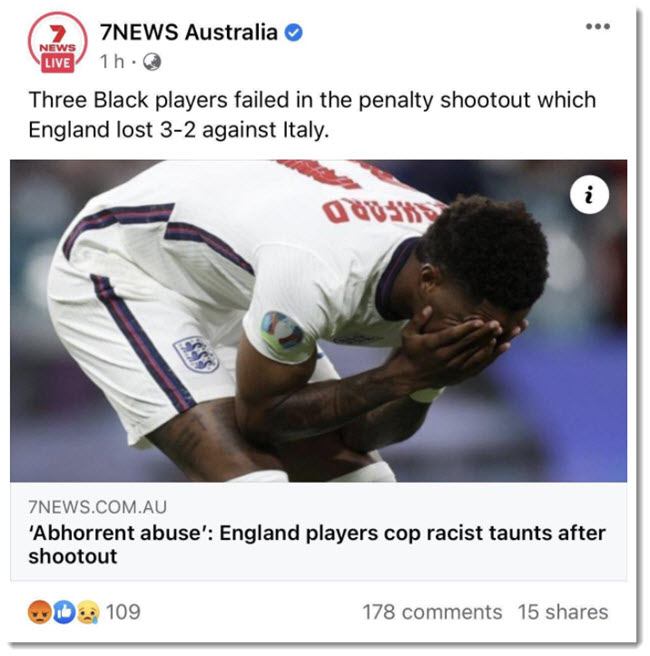
Before the game, the players on both sides took a knee to honour the Black Lives Matter movement. Before that, English fans booed the Italian national anthem.
After the match — after England had lost to Italy, after three English players had missed their chances in the penalty shoot-out, three English players who happen to be black — the dark sickness of English racism erupted.
Social media was vile, even by its own standards. You need no imagination to know what was going on.
Pushing back vainly against the tide, the English team was dignified and gallant in its visible embrace of and support for its own members. The Football Association denounced the “disgusting behaviour” of its own fans and declared them unwelcome. Prime Minister Boris Johnson told them to crawl back under their rocks, ignoring his own party’s blatant fanning of racism for political gain.
The social media platforms then copped their own abuse for allowing it to happen. Facebook and Twitter said they had been working frantically to take down racist posts and suspend accounts. We know, don’t we, how effective that will be?
And attention turned, as it so often does these days, to the hunt for the perpetrators and the call for their blood. It is fashionable to publicly identify the employer of an online troll and demand that they act. Savills, the massive UK property company, became aware that one of its employees had been tweeting racist insults about the black players and promptly suspended him pending an investigation.
Businesses are caught here, between the insistent demands of public sentiment (a mixture of ethics-based calls for integrity and basic witch-burning) and the rights of employees. It does, after all, remain legal to be a bigot.
It may or may not be that the performance of duties in a real estate agency by a particular employee will be relevantly affected by the fact that that individual is a racist arsehole who likes sharing their opinions on genetics. If they’re running a rent roll, definitely a problem. If they’re repairing the printer, maybe not so much.
Employers have rights too, including protecting their other staff from exposure to awfulness. At the time of the Cronulla riots, in an earlier life, I summarily dismissed an administrative staff member when I discovered they had forwarded an email chain encouraging the racist attacks. I didn’t think twice about it and wouldn’t again. Whether I had the legal right to take that action is less certain.
The answer is contextual, depending on the employee’s role and responsibilities, what’s in their contract and the company’s policies, and exactly what they did. As Israel Folau demonstrated, sacking an employee for expressing unpopular opinions is a fraught exercise.
Equally controversial would be the fate of the employee at Seven News who decided that the best way to headline a Facebook post reporting on the racist abuse of the England players was this:

Now that is racist, indefensibly so. Seven very quickly deleted the post as Twitter went into meltdown, but it had already been saved and shared a thousand times and the damage had been done.
I would argue that an act of such egregious offensiveness could not be committed by anyone who was not harbouring racist sentiments. It simply couldn’t occur to them to type those words otherwise.
So could Seven, assuming it wanted to, take disciplinary action against the employee? Certainly, their actions brought the company’s reputation down and were antithetical to what it says it stands for. I checked and yep, Seven has a diversity and inclusion policy. Tick.
For what it’s worth, my view is that Seven would be justified in terminating each person who saw and allowed the post to go up. Those employees might fight that, and their grounds could include that they were only acting in pursuit of their understanding of what their employer likes to generate: clickbait.
It may be hard for media companies in particular to hold their own employees to social values which their own corporate actions often belie. Still, News Corp (in the US) has lately sacked some men for sexual harassment, and strangely none of them pointed out that the company has an apparent editorial policy of attacking uppity women.
The point, for employers, is that it is a minefield. There are no clear bright lines of tolerance, reflecting society’s confusion about just how free speech should really be.
My advice, however: if you find that you have employed a person who hates people of colour, fire them. Whatever the law says about it, they’re filth.








Remember George Brandis? What a vile thing for him to say in Parliament. He defended “the righht to be a bidot” during the Govt plan to amend the Racial Discrimination Act in 2014. Just after the Abbott “no changes to….”pledge and Hockey’s “lifters and leaners” budget. What a pack of charlatans and things have only got worse since then. Yje govt used to try to look as if they cared – now there is no pretence.
Sorry, should read: “right to be a bigot”.
Right to be a bidet?
One of (and perhaps the only) truth uttered by Brandis. People DO have a ‘right’ to be bigoted or racist (or to not plan properly for their retirement, or to smoke and drink alcohol, or to do many things that others think they shouldn’t) or have a mindset that others disagree with. Nuance is then introduced depending on such things as use of employer’s equipment or time to promulgate their unpopular views. Much is made of ‘community values’ and ‘community expectations’, but little is ever made of the elephant in all rooms… the private thoughts and views of people who the jabbering elite have forced to stay silent.
Yesterday’s bigot is today’s pillar of the community and, on current time scales, tomorrow’s pariah.
Or have I that the wrong way around?
SBS sacked an employee Scott McIntyre for far less a few years ago, and Yassim al Abied (spelling) got driven out of the country for what I thought was nothing to get excited about.
They were the victims of bigots, not racists themselves.
I find this a really troubling trend because it a) blurs the line between one’s personal stances and the stances of the workplace, and b) is punitive for speaking out given nearly all of us need a job to earn a living. This is effectively allowing a mob or a tyrant (employer) to decide which of our values are allowed to be uttered and which are beyond the pale. An open democracy needs room for people to say unpopular and sometimes even odious things because what’s beyond the pale is a contingent and shifting standard. Or at the very least, should not be dictated to us by the tyrants and mobs that seek to silence us.
It sucks to be the one to stand up for bigots, but the alternative is far less palatable.
That may depend upon the policies set by the workplace itself. If the promotion of diversity is part of the workplace ethos and the ethical brand it presents to the public, then it could be argued that an employee who engages in racist behavior could tarnish the company’s reputation, bringing it into disrepute. Adhering to a company’s code of ethics is part of your work contract.
“If the promotion of diversity is part of the workplace ethos and the ethical brand it presents to the public, then it could be argued that an employee who engages in racist behavior could tarnish the company’s reputation, bringing it into disrepute.”
So if the employer dictates that they believe in traditional marriage, that should silence anyone on the matter outside their place of employment who might be pro-equality?
“Adhering to a company’s code of ethics is part of your work contract.”
This is tyrannical outside of the place of employment, and an infringement on a democratic right to speak up and speak out. I’m surprised anyone should think employers should have the power to decide what you are allowed to talk about outside the context of employment.
It’s like the old days when employers put morals clauses in that allowed people to be fired for being gay. It was considered immoral after all, yet I would have thought that people would have learnt from that dark chapter in history and realised that it’s none of the employer’s business what employees think or feel outside of their place of work.
I suppose people just like the power to punish the immoral. Who the immoral is gets defined by a contract so it’s okay to destroy their livelihood over it… Just so long as the employer is protected.
Thanks Michael for the very clear explanation that neither the general law (common and statutory) nor its branch of contract never will eliminate racism. And if it tried, the cesspool of racism would delight in its outlaw status. This because the disease of racism exists only in individuals’ fetid brains. That is a cultural and social problem, and less a legal problem. I agree that if an employee manifests racism, sack the bastard, despite the legal risks. Only overt social ostracism can make the point to the ignorant and the deluded. That is why it is crucial to call out racism every time you see it. But that takes courage and commitment. At least you can be sure of the fact that there is no racial distinction in humans. Only power and prejudice conjures race.
Well yes, Channel 7 if they had a halfway decent team, they should have caught it and maybe it speaks to their incompetence or, more concerning, their culture, that they didn’t. But you can also read it as someone picking up what the story was going to be, while contributing to that being the story. Complex. In so much these days it has to do with good faith and whether people believe you are acting in it. Channel 7 very problematic, Murdoch Press, bad faith is their brand.